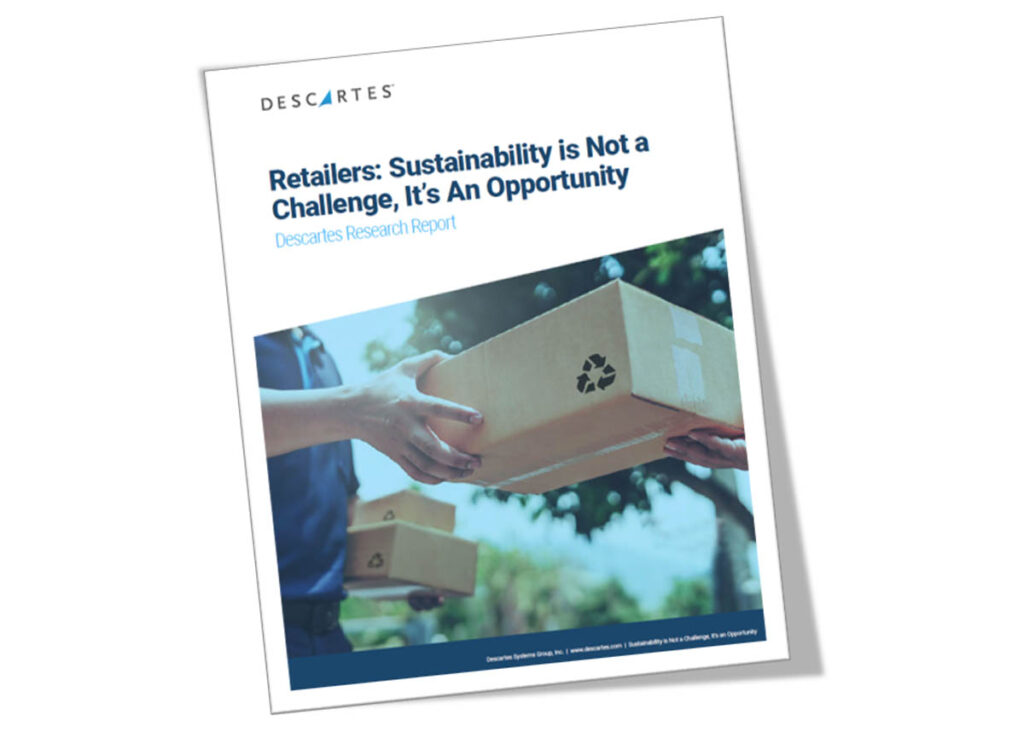Home delivery: one size does not fit all
14th November 2022

One of the key findings of Descartes’ recent study of consumer sentiment of sustainable home delivery practices was that consumers have different delivery expectations when it comes to sustainability. Half of the respondents said that they were quite/very interested in sustainable delivery options. Moreover, the great news about the delivery options favoured by consumers is that they are all lower cost alternatives. The challenge and opportunity, then, is for retailers to recognise that consumers want sustainable delivery choices and that providing choice results in happier customers and a better bottom line while helping the environment, as Chris Jones, EVP, Descartes, outlines.
Essentially, the study underscores that a lot of consumers have sustainable delivery personas. In fact, there are a number of delivery personas that retailers can use to increase loyalty as well as top and bottom line performance. So, what are delivery personas? The concept of buying personas is widely understood in the retail community as a way to maximise sales by serving different types of consumer purchasing experiences. The same thing can be applied to home delivery. Consumers have differing expectations for home delivery and are happier when they can select the delivery option that is most consistent with those expectations.
In working with leading retailers, we previously identified four delivery personas that relate to the speed and precision of a home delivery:
- Cost, Cost, Cost: Some consumers are extremely cost-sensitive and will take the slowest delivery service if it saves them money. They are willing to wait days for the product and care less when the delivery arrives during the day.
- Parcel Mentality: Typical parcel deliveries are fast, but not necessarily time definite at the point of purchase. The majority of goods such as apparel and other smaller items are delivered this way. These customers are happy with the fast delivery cycle and don’t care if the package is left on the doorstep sometime during the day.
- Convenience Matters: Many large format items fit into this category. These consumers don’t value fast; they value a tight time window. For instance, a kitchen renovation purchase (e.g. fridge) is made in advance, but the delivery is made close to the installation date. If delivered too early, the item would consume space in the customer’s home for weeks and risk damage until the appropriate time in the project for its installation.
- Time Is Their Currency: There are a class of consumers who are cash rich and time poor. They want their delivery ASAP and won’t sit around waiting all day for it. This may be high-value impulse purchase goods or replacement items, for example. These customers are also most likely to pay for the privilege and it doesn’t take too many of them to offset a significant amount of the overall delivery cost.
Now there is a fifth delivery persona: sustainability.
Clearly, the study identified that consumers want eco-friendly delivery options and are very flexible in terms of delivery choices when they are tied to sustainability efforts. For instance:
- Over half (54%) said that they would be willing to accept longer lead times for environmentally friendly deliveries.
- Half said that they were quite/very interested in grouping orders for delivery on a specific day of the week (50%) or when the retailer had deliveries in the area (47%)
- Almost half (48%) want the retailer to recommend the most environmentally friendly delivery option
All of these options present retailers with the opportunity to lower their delivery costs by reducing the number of deliveries they must make, increasing delivery density, better planning deliveries with longer lead times to improve efficiency and steering customers to eco-friendly – and lower cost – delivery options. In addition, the sustainability persona can be combined with other personas. For instance, identifying the most sustainable options for ‘parcel mentality’ or ‘time is their currency’ deliveries.
Sustainable delivery was so important to some that 20% of respondents said they would pay more for an environmentally-friendly delivery. For Gen Z and Millennials, the number increased to 27%. This may not sound like a significant percentage, but Descartes has worked with retailers who have realised millions of pounds in incremental revenue by up-charging for premium services at that attached rate.
Not only do consumers want eco-friendly delivery options, 42% of those surveyed also want retailers to provide details around the potential environmental consequence of their delivery options. The sustainability message here goes beyond retailers to the logistics industry as a whole (i.e. parcel carriers, LTL carriers, dedicated last mile services providers, etc.) as they will have to be able to provide the carbon footprint of their delivery services and – in a number of cases – do this dynamically for retailers.
Conclusion
Sustainability has now become an important delivery persona option. The key change for retailers to leverage delivery personas is to abandon monolithic, ‘one-size-fits-all’ approaches to home delivery, provide consumers with delivery choices that are priced accordingly and let consumers self-select the delivery option that best fits their desires. Consumers will happily select an option that could lead to lower costs or increased revenue for the retailer.
Just as retailers steer consumers during the buying experience, the same can also happen when consumers are choosing a delivery option. The study showed that almost half of the respondents wanted retailers to identify the most sustainable delivery options. How often do consumers want retailers to provide service options that actually lower the retailer’s costs? This is precisely why Descartes named the study “Retailers: Sustainability is Not a Challenge, It’s an Opportunity”.

